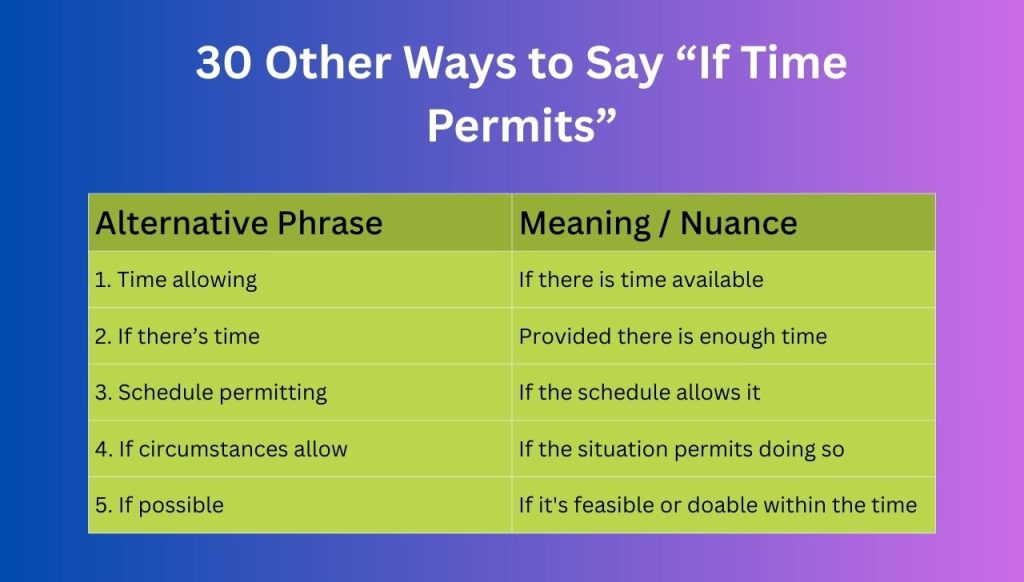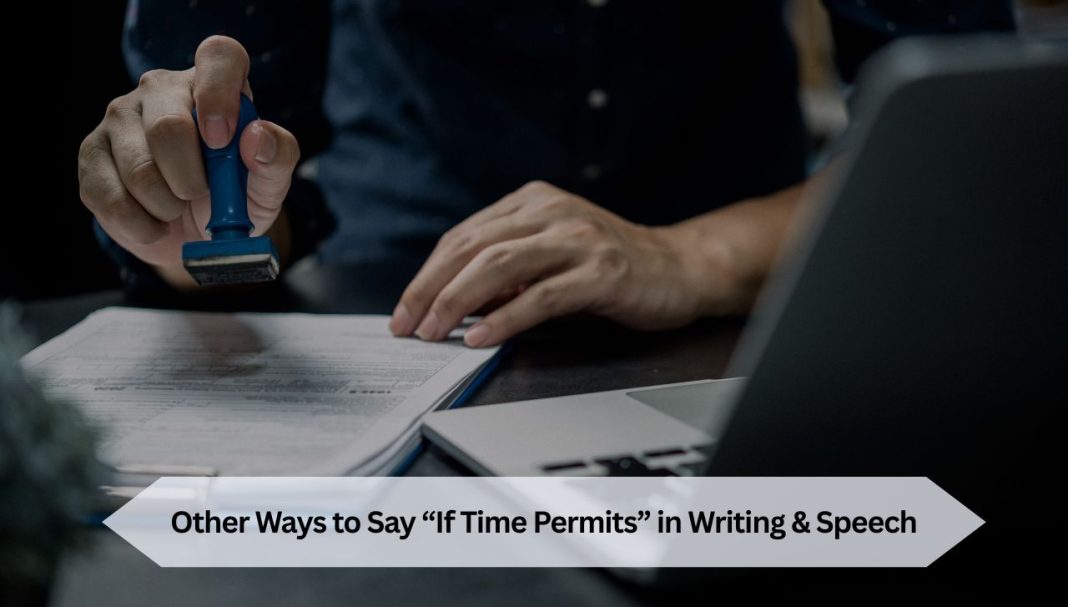We’ve all said it. In emails, during meetings, or while planning a jam-packed day: “If time permits…” It’s polite, non-committal, and perfectly vague—kind of like telling someone, “I might show up… if the stars align.” But here’s the thing. Language thrives on variety. And sometimes, you want to sound a little fresher. Maybe sharper. Or just less like everyone else in the room.
Let’s break down what “if time permits” actually means, when to use it, and why you might want to switch things up. Then I’ll give you a list of crisp, clean alternatives, ready to plug into your next chat, memo, or pitch.
Check This Out : 30 Other Ways to Say “Please Be Advised” (With Meaning, When & Why to Use It)
“If Time Permits” Meaning
At its core, “if time permits” is a softener. It’s how we express conditional intention. It means: I want to do this, but only if there’s enough time. Simple, right? It shows that you’re willing, but also realistic. You’re not overpromising. You’re adding a cushion, just in case life throws something wild your way.
In grammar terms, it’s a conditional phrase. The kind we use when we want to hedge a bit. Like saying, “If I feel better, I’ll come to dinner.” Or, “If the weather holds, we’ll barbecue.” But “if time permits” leans formal. Maybe a little stiff, depending on where and how you use it. That’s why swapping it out—especially in casual convos or fresh writing—can work in your favor.

When to Use “If Time Permits”
You’ll hear this phrase in a few common spots:
- In presentations – “I’ll cover the budget details at the end, if time permits.”
- At work meetings – “We’ll look at the Q4 numbers too, time permitting.”
- In writing – Emails, reports, or agendas often use it to suggest flexibility.
- In casual conversation – “I’ll swing by your desk, if time permits.”
It’s that friendly buffer between intention and obligation. You’re saying, “This might happen. Don’t count on it, but I haven’t ruled it out.”
It’s especially useful when dealing with schedules. Or when you want to sound diplomatic without flat-out declining something.
Why Say “If Time Permits”
Let’s be honest—sometimes we say this because we don’t want to commit. And that’s okay. It’s a classic line for:
- Maintaining flexibility – You’re not locking yourself into a rigid plan.
- Showing goodwill – You would do it… you just need the time.
- Sounding professional – It’s polite. A bit formal. Safe for work settings.
- Leaving a door open – You’re hinting you’ll try, without promising too much.
But repetition can dull your message. Say it five times in one meeting, and people tune out. That’s why fresh phrasing matters.

30 Other Ways to Say “If Time Permits”
Here comes the good part. Some of these are casual, others more polished. Use what fits your tone, your voice, your moment.
| Alternative Phrase | Meaning / Nuance |
|---|---|
| 1. Time allowing | If there is time available |
| 2. If there’s time | Provided there is enough time |
| 3. Schedule permitting | If the schedule allows it |
| 4. If circumstances allow | If the situation permits doing so |
| 5. If possible | If it’s feasible or doable within the time |
| 6. If it fits in the schedule | If it can be included in the current timeline |
| 7. If I/we have the time | If personal or team time is available |
| 8. Workload permitting | If the current workload is not too heavy |
| 9. If I/we can squeeze it in | If it can be managed within limited time |
| 10. If opportunity arises | If there’s a chance or opening in time |
| 11. Time permitting | A direct synonym; if time allows |
| 12. Should time permit | A more formal version of “if time permits” |
| 13. If we’re not pressed for time | If there’s no rush or deadline pressure |
| 14. Calendar permitting | If the calendar is not full |
| 15. When there’s a free moment | During a break or when time frees up |
| 16. If nothing else comes up | If no other priorities or interruptions arise |
| 17. If all goes well | If things proceed as planned and time is available |
| 18. If there’s a window | If a short period of time opens up |
| 19. If we can make room for it | If it can be added to the agenda |
| 20. If it doesn’t clash with other plans | If it doesn’t conflict with existing commitments |
| 21. Assuming we have time | Based on the assumption that time is available |
| 22. If we’re ahead of schedule | If things are completed earlier than expected |
| 23. If it’s not too late | If there’s still time before a deadline or close of day |
| 24. As long as time permits | So long as there is enough time |
| 25. Time being on our side | If circumstances give us more time |
| 26. Given a chance | If the opportunity arises |
| 27. When time allows | At a time when there is no time pressure |
| 28. If we get a break | If a short rest or opening occurs |
| 29. If nothing urgent comes up | If no pressing matters intervene |
| 30. If we can carve out some time | If we can deliberately allocate time despite a busy schedule |
Check This Out : 30 Other Ways to Say “Enjoy Your Weekend” (And When to Use Them)
Conclusion
We lean on phrases like “if time permits” because they’re safe. They let us float between intent and reality, without boxing us in. But the more you write, speak, and plan, the more you’ll want options that feel fresh. More natural. More… you.
So go ahead—toss in “schedule permitting” next time. Or say, “If I get a chance,” with a smile. It’ll land just right. And if this article helped, maybe you’ll read another one… you know—if time permits.

Grammar Nerd, ESL Trainer, Low-Key Comma Crusader
Daniel has taught English for over a decade, from small community classes in Oaxaca to bustling university halls in London. He has a knack for turning even the driest grammar points into relatable, real-life language tools—think fewer red pens, more real talk. He co-founded Grammation to make grammar less gatekeeper-y and more global. When he’s not decoding sentence structures, he’s probably hiking with a paperback novel or adding unnecessary hyphens for fun.
“The rules of grammar should empower people—not trip them up.”


